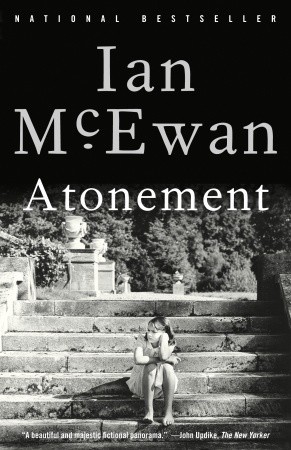 Atonement has been on my to-read list for a while, but I finally got around to it because I fit it into both my normal reading challenge and my romance reading challenge for 2016. For my regular reading challenge, it fit the category of "A book set during wartime." For the romance challenge, I slotted it in for "A literary romance."
Atonement has been on my to-read list for a while, but I finally got around to it because I fit it into both my normal reading challenge and my romance reading challenge for 2016. For my regular reading challenge, it fit the category of "A book set during wartime." For the romance challenge, I slotted it in for "A literary romance."Atonement is a weird sort of book. It has a meta storyline, fitting the events of the book into their own book story. The plot follows two sisters of the wealthy Tallis family, Cecilia and Briony, and the son of the family's charwoman, Robbie. One day in 1935, there's a house party at the Tallis home for Cecilia and Briony's visiting brother and his friend. Briony, an aspiring author and possibly playwright, sees a confrontation between Cecilia and Robbie, who both attended the same school and have spent the past few years in a sort of dance around each other, drawn to each other but unable to put a pin in their feelings. Briony, ten years younger than Cecilia and Robbie and not within hearing distance, thinks Robbie is coercing Cecilia into some perverse act that involves taking her clothes off and getting into a fountain. Later, when Robbie puts his feelings to paper in an apology to Cecilia, he gives Briony the note to deliver and she reads it--but Robbie has actually given her a draft that includes some passionate but rather vulgar phrasing, and it helps to cement in Briony's mind that Robbie is a dangerous deviant. All of this sets off a chain of events that ends with Robbie being falsely accused of rape and imprisoned, and then joining the infantry just before the start of World War II to lessen his prison sentence. All the while, he and Cecilia maintain a relationship via letters, and Cecilia severs her relationship with her family due to how easily they turned on Robbie.
The romance in here is definitely a secondary story, with the main story revolving around the devastation the rape allegations wreak on Robbie's life and, to a lesser degree, Cecilia's, and how Briony comes to the realization that she was wrong as she grows older and tries to atone for her actions, even though there's no way she can completely right the wrong she committed. This is an interesting concept, and once the book moved into the second and third parts, it moved quickly and was pretty enjoyable. However, the first part, which takes up the first half of the book, is very slow, and it almost had me quitting reading a couple of times. The problem is that, despite the part taking place over only a day, it just drags. Pretty much every scene has to be rehashed from at least two different viewpoints, and while I understand that the perspectives were necessary to introduce both the truth of the events and how Briony interprets them, but I can't help but wonder if there would have been a more streamlined way to do this that wouldn't have resulted in the beginning of the book being so incredibly slow and clunky.
Later in the book, Briony receives a rejection letter from a literary magazine to who she'd submitted a piece of writing based on the pivotal events of the book. The letter contains a bunch of advice for Briony about the weak points of her work--and I couldn't help but feel like those weak points were still evident in the book itself, which is ultimately supposed to be Briony's final draft of the events, one that she's worked over again and again for decades. But I found the same weaknesses and tedium in it that were pointed out in this fictional rejection letter, and it just highlighted to me that the beginning of the book was...not that good.
Overall, I can see why people like this--it's very meta, and the later parts of the book are enjoyable. But the slow beginning and rehashing of any and every event in the first half of the book really impacted my enjoyment of it.
3 stars out of 5.
No comments:
Post a Comment